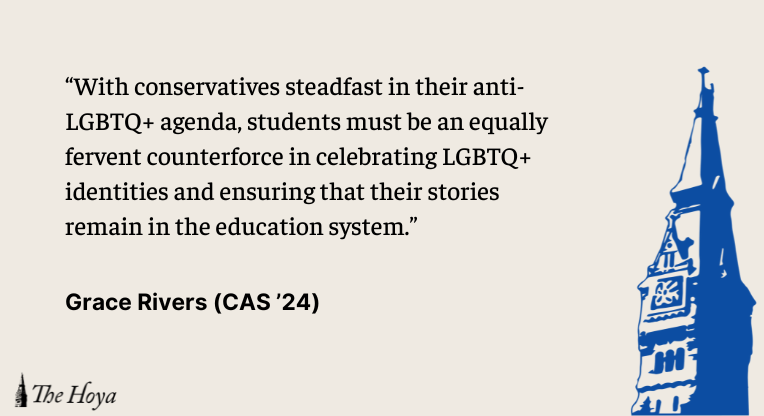The United States faced its largest ban of books recorded in any year from July 2021 to June 2022. There were more than 2,500 individual book bans across the nation in that period according to Pen America’s Index of School Book Bans, the most in any recorded year. The index listed another 1,477 bans during the first half of the 2022-23 academic year, largely in school districts in the South.
This record number of book bans testifies to the burgeoning conservative movement to censor topics of gender, U.S. history and race. LGBTQ+ stories in particular have emerged as a target of the book banning movement, especially by Governor Ron DeSantis of Florida. In 2021, 41% of banned titles had some connection to the LGBTQ+ community.
In the wake of this widespread book censorship, Georgetown University students must remain steadfast in their support of the LGBTQ+ community on campus and advocate for the celebration of LGBTQ+ stories in classrooms across the country.
Book bans are not a novel thing. In fact, historians trace efforts to censor classroom content all the way back to the American Civil War, when the Confederacy barred Harriet Beecher Stowe’s “Uncle Tom’s Cabin” from bookstores on the basis of its pro-abolitionist message.
Prior to 2020, individual parents, concerned over a single book their child was reading in the classroom, directed the vast majority of book censorship. However, over the last three years, conservative legislators, such as Texas Governor Greg Abbott and South Carolina Governor Henry McMaster, have taken the reins of the movement, capitalizing on a culture of fear.
Therefore, recent efforts to ban books reflect a growing coalition of conservative groups and leaders, organizing to protect what they call “parental rights,” or the parent’s right to take action on behalf of their child. In legislatures across the county, Republicans often object to sensitive, inappropriate and pornographic content on this basis.
However, in practice, titles regarding Black or LGBTQ+ people have received the most scrutiny and limitation. With certain Republicans intending to eliminate LGBTQ+ content and critical race theory — which states that race is socially constructed — from schools, the bans fit into their traditional, conservative agenda.
The ease with which legislators and parents alike can remove a book from shelves is staggering. A new piece of legislation in Florida — House Bill 1069 — that passed this March, would require schools to swiftly remove a book from shelves based on a single complaint.
Coupled with DeSantis’ infamous Don’t Say Gay Bill, which restricts lessons regarding sexual orientation and gender identity, LGBTQ+ stories have been largely silenced in Florida’s public schools.
Although the extremity of Florida’s legislation has garnered national attention, Florida is not the only state to pursue such bans. In the first half of the 2022-23 academic year, book bans rose 28% compared to the prior six months. The most drastic adoptions of book bans were seen in states of the South and Midwest, like Texas, Florida, Missouri, Utah and South Carolina.
Book bans even impact the DMV, with conservative Virginia legislators challenging more than a dozen books over what they deem “sexually explicit content.” Of the 17 books Steve Ikenberry, a school board member for Virginia’s Hanover County, asserts should not be on shelves, 29% center around LGBTQ+ themes or characters.
As book bans and LGBTQ+ censorship sweep the nation, Georgetown students must be active in their support of the LGBTQ+ community both on and off campus. With conservatives steadfast in their anti-LGBTQ+ agenda, students must be an equally fervent counterforce in celebrating LGBTQ+ identities and ensuring that their stories remain in the education system.
Participating in local protests, becoming an active member in GU Pride and supporting Georgetown’s LGBTQ Resource Center are all tangible means of uplifting LGBTQ+ students on campus and advocating for LGBTQ+ education in academic spheres.
Although book bans continue to advance across the country, we must ensure that LGBTQ+ stories are not silenced and that they continue to reach younger generations.
Grace Rivers is a senior in the College of Arts & Sciences.














